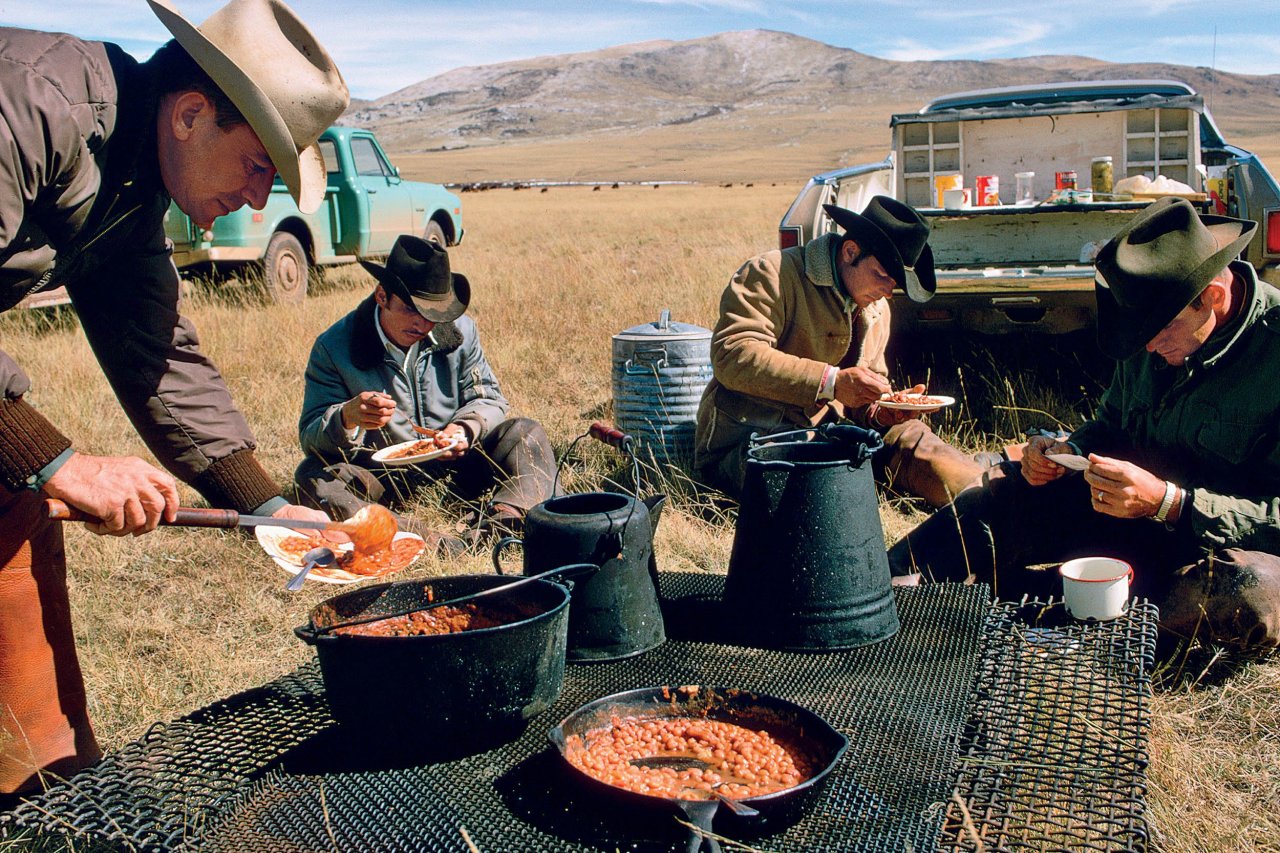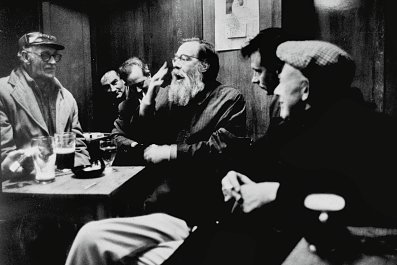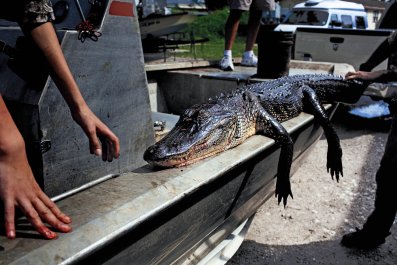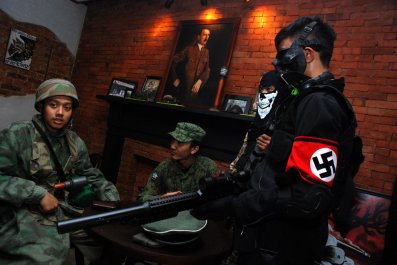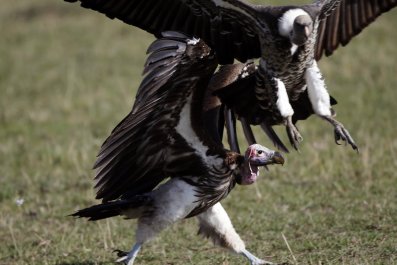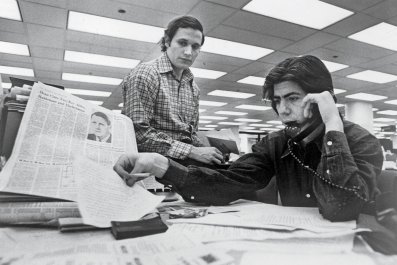Forty years after Mel Brooks's Blazing Saddles revealed the beaning of life in the campfires of a million Hollywood horse operas, fart humor has become a staple of sitcoms, stand-coms, rom-coms and, yes, even zom-coms. Indeed, if the 1993 film Scent of a Woman were remade today, its blind protagonist would likely detect more than just whiffs of desperation.
This year's models range from Heinz's famously rude Super Bowl ad, to the Belcher kids' Fart School for the Gifted music video on the Fox cartoon Bob's Burgers, to Seth MacFarlane's A Million Ways to Die in the West, a movie he ripped on The Tonight Show with his own peremptory headline: "Boy Blunder Farts His Way to Failure in Worst Western."
The formula for the successful fart joke is not rocket science, even though it is methane-based. "In film, it's considered the lowest laugh there is," says Adam McKay, the onetime head writer at Saturday Night Live. "To reach escape velocity with a fart joke, you've first got to bust through the shame wall. Everyone likes to think they're smart and have highbrow taste in comedy, but the truth is, none of us do."
Entertainers have been making fart jokes for as long as they've been making farts. On the literary end, the great fartistes include Aristophanes, Dante, Chaucer, Shakespeare, Ben Johnson (whose 1610 comedy The Alchemist opened with the line "I fart at thee!"), Rabelais, Ben Franklin, Jonathan Swift, Mark Twain and James Joyce ("asquat the cuckstool…seated calm above his own rising smell"). When not waiting for Godot, Samuel Beckett occasionally floated air biscuits: "And in winter under my greatcoat, I wrapped myself in swathes of newspaper, and did not shed them until the earth awoke, for good, in April. The Times Literary Supplement was admirably adapted to this purpose, of a never failing toughness and impermeability. Even farts made no impression on it. I can't help it, gas escapes my fundament on the least pretext."
Farts got their first big break in film at the 1900 World's Fair in Paris, where gas escaped the fundament of Joseph Pujol, a Frenchman known as Le Pétomane (Fartomaniac). Pujol's sonic impressions were captured by none other than Thomas Edison. Among Le Pétomane's many talents was the ability to toot La Marseillaise, set his raspberries on fire, extinguish candles at three paces, smoke Gitanes down to the butt and play an ocarina with the aid of a rubber hose. In tribute to the celebrated cheese-cutter, Mel Brooks would later name one of his Blazing Saddles characters Governor William J. Le Petomane.
As impressive as Le Pétomane's feats sound, his trouser coughs wouldn't have gotten him to the finals of the Crepitation Contest, a 1946 blowfest otherwise known as Battle at Thunderblow. Recorded in Toronto as an in-house Canadian Broadcasting Corp. joke, with sportscaster Sidney S. Brown doing the bleet-by-bleet, the recording was sold under the counter and quickly became an underground sensation.
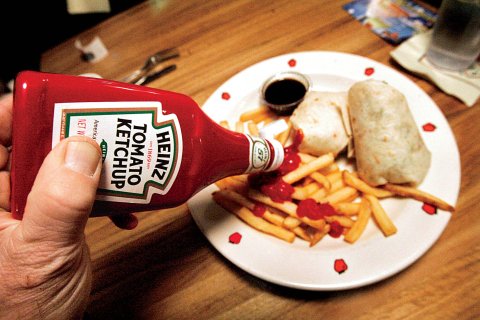
To recap: Lord Windesmere (representing the British Empire) defends his title at the Maple Leaf Auditorium against Paul Boomer, an Australian who has trained on Melbourne cabbages. Taking turns at the "farting post," the competitors score points by uncorking an ear-bending array of flati: "sizzlers," "plotchers," "trill blows," "flutter blasts," "freeps," "fudgies" and "follow-up floopers."
For much of the past century, comedic crepitus was smelt, not dealt. In the Marx Brothers's 1932 football romp Horse Feathers, the "college widow" tries to endear herself to Professor Wagstaff (Groucho) in a canoe. "Oh, professor," she coos. "You're so full of whimsy."
"Can you notice it from there?" asks Groucho. "I'm always that way after I eat radishes."
After that, fart jokes erupted only intermittently in movie theaters, perhaps most memorably during Road to Morocco (1942), in which Bing Crosby and Bob Hope jury-rigged a whoopee cushion to deflate under a sheik. The televised fart was perfected, if not pioneered, in the 1960s by British comic Benny Hill, the original Dirty Old Man of the BBC. In one sketch, he essays a member of the Southern gentry around the time of the Civil War. As he gazes out from a rattan armchair on the veranda of his Tara-like plantation house, his wife nags, "You could have called this place anything—Passing Breeze or Passing Zephyr. But...Passing Wind?"
Smiling beatifically, Hill responds in a drawl so thick you could dip cornbread in it, "I like passing wind!"
It wasn't until 1974 that farts hit their cinematic stride. In the bean-fueled Blazing Saddles, one cowboy freep begets another. And another. And another...
How did Mel Brooks decide enough was enough? "I had a rough cut, and maybe I had 16 farts," he has said. "Things didn't get exciting until the fourth or fifth one, and the laughter began to diminish around the 12th fart, so I said, "OK, cut it off at 12." I did it kind of systematically. I do a lot of homework."
McKay believes the farts in Blazing Saddles are impossible to top. "They're the first in contemporary cinema, and the biggest," says the director of Anchorman and Talladega Nights. "When you do a fart joke on film, you're always under that movie's large shadow."
A comedy giant—he's 6 feet 5 inches—McKay is also a film-fart aficionado. "What other jokes are there like that which instantly deflate all pretension?" he asks. Yet of his five big-screen collaborations with Will Ferrell, Step Brothers (2008) is the lone picture in which gas is passed. During a job interview, John C. Reilly vents one that lasts 15 seconds. "A three-second fart is not really funny," McKay says. "A seven-second fart, that's kind of getting funny. Twelve seconds? Oh my God, that's long! Maybe too long. But when you go to 15 seconds, it gets really good."
While workshopping the script, McKay told Ferrell, "If we stick a fart in, we're not getting good reviews. It's that simple. Because the laziest criticism of all comedies is 'Oh, it's just a bunch of fart jokes.'" Sure enough, critics held their collective noses. The 55 percent score on Rotten Tomatoes for Step Brothers is the lowest in the McKay-Ferrell canon. "Guarantee you, it's because of that fart joke," McKay says. "But it's still my favorite movie we've made. We're not in this for reviews or awards, so I'm certain we'll do another fart joke someday."
Stretched out like Benny Hill in a leather recliner at his Hollywood production office, McKay mulls the milestones of cinematic butt trumpeting. He cites Monty Python and the Holy Grail, Revenge of the Pink Panther, Caddyshack, Dumb and Dumber, The Nutty Professor, Austin Powers: International Man of Mystery, American Pie, Click, South Park: Bigger, Longer & Uncut, Beavis and Butt-Head Do America, Jay and Silent Bob Strike Back, Naked Gun, Ghost World, Dances With Wolves, Rain Man, Amadeus, Zombie Ass: The Toilet of the Dead and F.A.R.T: The Movie, an obscure 1991 stinker whose tagline boasted: "Russell has two passions: watching television and farting! He also loves Heather. Heather HATES farting. The eternal triangle!"
McKay says artsy foreign farts—as in Federico Fellini's Roma (1972)—tend to be more palatable to American moviegoers than the homegrown variety. "An Italian fart joke is considered charming and rustic," he says. "But an American fart joke is ugly and in-your-face."
Usually, but not always. A 2012 episode ofParks and Recreation hinged on the funky rollers of office scapegoat Jerry Gergich (Jim O'Heir). When Jerry pops a fluffy during a heart attack, colleagues dub it a "fart attack" and rib him all the way to hospital. "That might be my favorite fart joke," says McKay. "Shows how juvenile Jerry's co-workers are. They can't get past the fact that he's farting—and he's dying!"
He reckons fart gags are embraced most warmly when filtered through childhood memory. "Thirty years ago, Ingmar Bergman's Fanny and Alexander won the Oscar for Best Foreign Language Film," he says. "People loved the crazy old uncle who entertains kids on the stairs with fart tricks. It made me want to do a serious, introspective movie with a fart joke."
McKay has inserted cheek sneaks in every film he's made. Most didn't pass the stink test. The one he and Ferrell wrote for Anchorman discomfited preview audiences because they couldn't tell which character had dropped the bomb. "One weird thing about a fart joke is that it's disembodied," says McKay. "Since it relates to smell and location, it's hard to do in movies and on a TV screen."
One of the deleted bits in Talladega Nights involved a down-and-out Ferrell trying to please his mom by farting the phrase I LOVE YOU. "It was one of the funniest scenes we shot," recalls McKay. "When we showed it to test audiences, it got some laughs, but not enough. If you're going to do a fart joke, it's got to be fantastic."
When McKay and Ferrell were hired to punch up the screenplay of the recent Smurfs 2, they inserted a G-rated fart joke. "We had a really good one about Smurf farts smelling like nectar berry," says McKay. "We thought, This film is for little kids. The joke will be fine."
It wasn't. A studio suit told McKay, "We think our movie's smarter than that."
To which the only appropriate response was "Pfffffffffft!"



